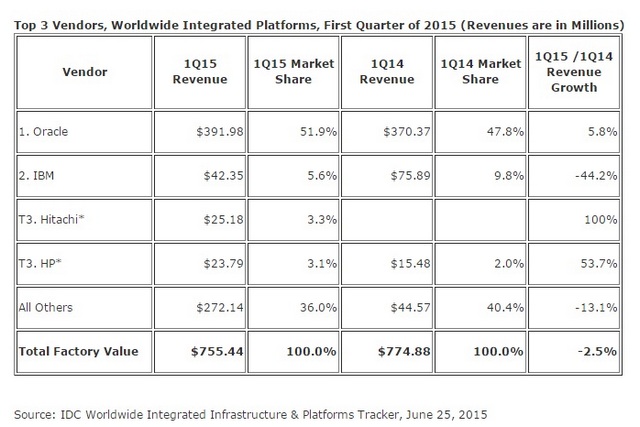
Considering summer is unofficially over, it was a slow news week from suppliers. IBM did make an interesting move by picking up software developer StrongLoop. This continues their strategy on cloud and mobile. IBM also announced the opening of Watson Health Center in Boston.
Oracle is quietly cutting their Java experts while HP overtakes Cisco in providing cloud infrastructure. Red Hat CEO Jim Whitehurst details how his company makes money on services when the software is free.
IBM
- IBM Opens Watson Health HQ, Expands Watson Health Cloud
It reads like a press release, but interesting information…IBM opened its new IBM Watson Health global headquarters in Cambridge, Mass., and announced that Deborah DiSanzo is joining the company as the business unit’s general manager. The IBM Watson Health Cloud for Life Sciences Compliance will help biomedical companies bring medical innovations to market more efficiently. This solution will help the companies fast-track the deployment of a GxP-compliant infrastructure and applications while adhering to stringent requirements for hosting, accessing and sharing regulated data.
http://www.eweek.com/it-management/ibm-opens-watson-health-hq-expands-watson-health-cloud.html
More on the office they are opening in Boston:
http://www.betaboston.com/news/2015/09/10/ibm-announces-watson-health-office-space-in-kendall-square/ - IBM Has Been A Terrible Steward Of Shareholders’ Capital
One company that hasn’t shown an ability to innovate in the way that it competes in the market – especially in cloud – compared to someone like Microsoft, who is a chief competitor, is IBM. Like Apple, IBM has also been a slave to a dividend and buyback program. Like Apple, IBM has spent over $100 billion on its buyback program. And, like Apple, IBM’s stock price has lagged the overall market in the last three years.
- IBM Acquires Node.js Developer StrongLoop (no word on price yet)
StrongLoop is as startup based in San Mateo, California. The company focuses on the creation and development of software for enterprises by using the open-source JavaScript programming language Node.js. Software built by StrongLoop allow companies to create cloud and mobile based apps which are equipped with APIs that allows them to handle massive amounts of data through mobile, web and Internet of Things apps.
http://en.yibada.com/articles/62707/20150911/ibm-acquires-node-js-developer-strongloop.htm
- Box shows how a single deal with IBM can move the needle for any $2 billion company
The partnership, announced in June, allows both companies to plug-in to each other’s technologies, while working on joint apps and sales strategies. Box benefits by gaining access to IBM’s wide array of technologies and client network. IBM gets to tap into Box’s advanced cloud storage offerings.
http://www.businessinsider.com/box-earnings-ibm-partnership-2015-9
EMC
- Breaking up EMC is a dumb idea, says VMware CEO Pat Gelsinger
“Activist investors are pretty simple folk. Their objective is as quickly as possible drive change that increases shareholder value.” The EMC Federation, Gelsinger feels, has “laid out a strategy for this period of tumult.” “Being bigger and more strategic is the right strategy,” he adds. “That is the perspective we have taken through the changes. And we think that in the longer term we will be rewarded for that.”
http://www.theregister.co.uk/2015/09/08/breaking_up_emc_is_dumb_to_do_says_vmware_ceo_gelsinger/
- VMware Partners Still Expecting Big Changes Ahead For vCloud Air Hybrid Cloud
Although hybrid cloud remains a huge part of VMware’s strategy, the VMware partners said they’re expecting EMC to combine vCloud Air with its Virtustream cloud business in a new company under the EMC Federation. EMC closed its $1.2 billion acquisition of Virtustream in July.
Hewlett Packard
- More HP Involvement at SurveyMonkey… Hewlett-Packard’s (HPQ) CEO Joins SurveyMonkey Board
Whitman, 59, was appointed to run the computer giant in Sep 2011. She will lead the new H-P Enterprise business group post the spilt in Nov 1 this year. Whitman stated that this is the right time for her to join the board of SurveyMonkey. She looks at the offer as an attractive one as it’s her first external board appointment since she joined H-P in 2011.
http://www.nasdaq.com/article/hewlett-packards-hpq-ceo-joins-surveymonkey-board-cm519157
- HP overtakes Cisco in cloud infrastructure battle – finally
After nipping at Cisco’s heels for two years, HP finally overtook arch rival Cisco in the cloud infrastructure equipment battle in Q2, albeit by the slimmest of margins. Synergy Research Group says after tying in Q1 with 13%, HP finally wrestled top spot from Cisco which declined by half a percentage point, while HP remained consistent on 13%.
http://channellife.co.nz/story/hp-overtakes-cisco-cloud-infrastructure-battle-finally/
Other
- Oracle cuts Java execs
Cameron Purdy, a senior vice president for development and a noted Java evangelist, left Oracle in August after more than 8 years at the company, according to his LinkedIn bio. In a few tweets, he indicated that this was Oracle’s decision.
- SAP Finance Chief Says Company Done With Big M&A Deals for Now
“I see no need in the foreseeable future for big acquisitions,” Chief Financial Officer Luka Mucic said at a meeting with reporters Thursday at the company’s headquarters in Walldorf, Germany. “If you talk about big acquisitions, what is left in the market?”Salesforce.com Inc. is too expensive and Workday Inc. would overlap with SAP’s product line, Mucic said.
- Red Hat: How One CEO Uses Extreme Openness To Lead 8,000 People
Adams: I have to ask: How do you make money on free software? Whitehurst: It’s very hard. The source code to all our software is indeed free. We offer services and support. You can download random Linux or open source software. But if you’re running nuclear submarines, major stock exchanges, or big banks, you want to make sure they’re secure and that you have support. We’re a business-to-business company.





